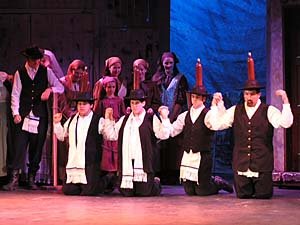"Why do your disciples not follow the tradition of the elders." (Mk 7:1-8, 14-15, 21-23)

When I was reading the gospel for this sunday, I came across the word tradition. Something clicked in my mind, as if a bulb had been suddenly turned on. The movie/broadway musical Fiddler on the Roof came to mind. I guess it was the song about tradition that was responsible.
Jesus was condemning the scribes and Pharisees because they were giving more importance to human tradition at the expense of God's Laws.
We also have traditions and Tradition in the Church. And sometimes we hold on to these traditions as if they belong to Tradition.
Let me explain.
Traditions (plural and with a small letter "t") refer to expressions of the Faith that might be appropriate for a certain time in history but which may have become meaningless or less helpful when the Church enters another period. These have to give way to another more appropriate or clearer expressions of the Faith.
For example, Mass used to be celebrated in Latin and in the way decided on by the Council of Trent. But with Vatican II the Church leaders saw the wisdom of a liturgy in which the faithful could participate actively, consciously and intelligently. Hence, liturgical texts were translated into languages that people understood. And the celebrant now faced the people.
Another example. Women used to wear veils in church. But Church leaders saw that this was a practice that might have been appropriate for a certain time and a certain culture. Today it is no longer obligatory. Now women do not wear veils for Mass.
But Tradition is another matter. It is the deposit of Faith that has been passed on faithfully from one generation to the next. This deposit does not change, although our understanding of it may grow.
Today what we believe about the Eucharist is the same as what the early Church believed. We believe in transubstantiation as our ancestors in the faith did. We believe as they believed that Christ is really present in the Eucharist. The Eucharist is not merely a symbol.
Our belief in the dogam of the Immaculate Conception did not only begin in the 19th century, although the dogma was proclaimed in that century. It had roots in the Faith of the early Church.
What has Tradition to do with us?
Parents are the first teachers of their children. First, it is important that they know and practice their Faith. And secondly, that they fulfill their obligation to pass on this Faith to their children. For the faithful handing down of the Faith is not just the business of priests and bishops. It is the responsibility of the whole Church. And that includes lay people.



